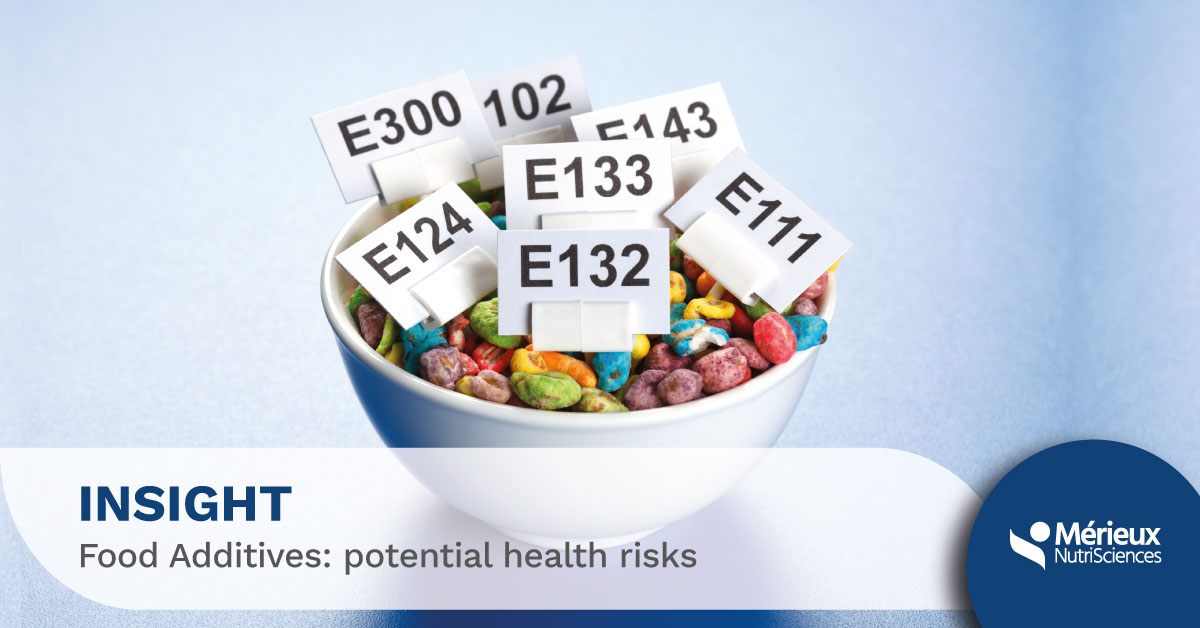FOOD ADDITIVES: WHAT ARE THEY AND WHAT ARE THEIR POTENTIAL HEALTH RISKS?

Food additives are substances (with or without nutritional value) added to foods during their manufacture, processing, preparation, packaging and transport. They perform numerous technological functions such as colouring, sweetening, enhancing flavour, improving consistency and preservation of various food products (Reg. EC No. 1333/2008). They can be of natural origin such as ascorbic acid and lycopene or of synthetic origin such as aspartame and sodium glutamate.
In the European Union, they are identified by a number preceded by the letter E and divided into eight groups according to their function.
• E100-E199 (dyes)
• E200-E299 (preservatives)
• E300-E399 (antioxidants and acidity regulators)
• E400-E499 (thickeners, stabilizers and emulsifiers)
• E500-E599 (acidity regulators and anti-caking agents)
• E600-E699 (flavour enhancers)
• E900-E999 (various)
• E1000-E1999 (substances not covered by previous classifications)
An additive to be added to a food must meet certain purity criteria set out in Reg. (EU) No 231/2012 and its presence in the food must always be indicated on the label, as established by Reg. (EU) No 1169/2011.
The need to use or not to use the food additives in a food depends on several factors such as the production process used, the ingredients present in a food, the desired final appearance of the food, the type of preservation required, the conferral of antimicrobial activity, the type of packaging used etc.
The more processed a food is (snacks, sauces, sweets, etc.), the greater the number/amount of additives allowed and used. For other foods such as milk, fresh fruit and vegetables the use of additives is limited and for others such as pasta, olive oil, honey is prohibited because the use of additives has no technological function.
Over the years, the use of food additives has brought many benefits to the agri-food chain, such as the possibility of producing, storing and distributing food in distant geographical areas to encourage globalization of markets, improving the final composition of food products with a view to increasing market competitiveness, improving the success of business productivity and, above all, increase the level of food safety required by the official authorities to protect the health of consumers.
However, the incorrect use of many of them could pose a serious health risk. A number of serious and/or fatal allergies to high quantities of food additives have been reported (e.g. betanin (E162) allergy in persons allergic to beetroot) as well as several cases of stomach cancer caused by the high content of nitrates and nitrites present mainly in canned meats, cured meats and processed meats. Other additives considered potentially dangerous and currently under study are potassium bromate, BHA and BHT, propyl gallate and diacetyl widely used in bakery products, sauces, beverages, etc. and held responsible for respiratory, cardiovascular, endocrine and reproductive disorders, but also cancer.
All food additives allowed in the European Union (EU) are considered safe, but it should be noted that they are periodically submitted to safety assessments by the EFSA (European Food Safety Authority) which, on the basis of any new scientific information, will indicate a risk to health, also in the light of changes in the conditions under which they are used. Examples are E128 additive (2G red dye withdrawn from the market in 2007 because it is carcinogenic) and E171 additive (titanium dioxide that will be banned from 2022 because it is genotoxic) considered safe in the past, but dangerous now.
Finally, it is important to know that, for each food additive, where possible, there is an acceptable daily intake (ADI) that an individual can take on a daily basis without running into any risks and that the studies on their safety as well as the legislation regulating their use are in continuous implementation and evolution.

